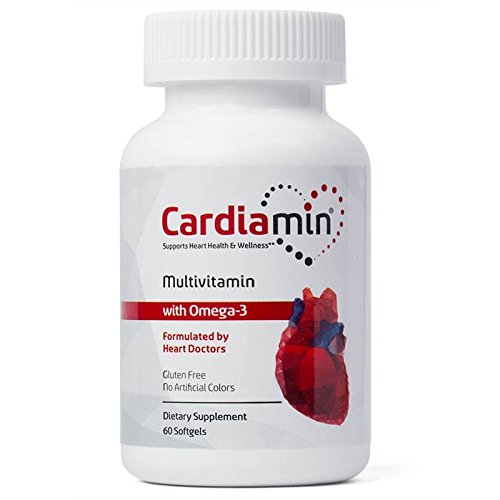Designed by heart professionals, Cardiamin Heart Health and General Wellness Multivitamins are full of helpful vitamins encapsulated in easily digestible soft-gels. This multivitamin and fish oil combo is designed specifically for heart health. This supplement is gluten-free, has no artificial colors, and is manufactured in FDA-GMP certified facilities.
How will Cardiamin benefit your heart? Let’s look at the ingredients.
Omega-3

This supplement contains EPA and DHA omega-3 fatty acids (found in fish and shellfish). You have likely heard of the many benefits of omega-3 consumption—it is helpful for your brain, joints, gut and your heart.
Omega-3s are known to lower triglyceride levels. Triglycerides are lipids (fat) found in the blood. You body stores calories you don’t need right away as triglycerides, so it can use them later. High triglyceride levels can cause buildup of plaque in blood vessels. As omega-3 fatty acids lower triglyceride levels, they protect your heart. [1] [2] [3]
These fatty acids may also help lower blood pressure in patients with high blood pressure (hypertension). Studies have shown that omega-3s don’t always lower blood pressure in subjects with normal blood pressure or moderate hypertension. However, omega-3s can lower blood pressure in patients with severe hypertension. [4] [5] [6]
Cardiamin contains over 1,600 mg of omega-3 fish oil to ensure your heart’s health.
Vitamin D
Cardiamin has 1,000 IU of vitamin D per serving. Vitamin D is actually a pro-hormone and, unlike other vitamins you only get through your diet, your body can create vitamin D when you are exposed to sunlight. Vitamin D is important supporting healthy bones, teeth, brain, and nervous system. It helps manage the immune system, regulates insulin levels, and influences the expression of genes involved in cancer development. [7]
Vitamin D also supports cardiovascular health. Vitamin D deficiency is associated with increased risk of cardiovascular disease, hypertension, and other conditions. Additionally, scientists believe that vitamin D helps improve the body’s sensitivity to insulin (the hormone that regulates blood sugar) and reduce the risk of insulin resistance which can lead to type 2 diabetes. High blood sugar levels can cause damage to your blood vessels over time, and vitamin D can help prevent that. [8]
Besides helping your heart, it can also boost your mood, so there is little reason not to include vitamin D in your daily diet! It is also beneficial to get at least 15-20 minutes of sun exposure every day to increase your own body’s production of vitamin D.
Vitamin C

One of the most helpful and safest vitamins, vitamin C benefits several areas of our health. Cardiovascular health, the immune system, and eye health all benefit from vitamin C, while the vitamin simultaneously protects us from cancer and stroke.
Vitamin C is an antioxidant, so it protects healthy molecules against free radical molecules, toxic chemicals, and pollutants. It is necessary in the growth, development, and repair of all body tissues.
Most people are not getting enough vitamin C. As an essential vitamin, you must get vitamin C from your diet. Taking a supplement such as Cardiamin and eating plenty of fruits and vegetables will help you reap the benefits of this helpful vitamin. [9]
Vitamin E
Vitamin E is used to treat and prevent heart diseases and blood vessel conditions. Because vitamin E is an antioxidant, it can protect against free radical molecules. This may help prevent degenerative diseases like the hardening of the arteries (atherosclerosis). It works even better to prevent atherosclerosis when it is combined with vitamin C. It is also used to prevent chest pain (angina), leg pain due to blocked arteries, and high blood pressure. [10] [11]
Vitamin B6

Vitamin B6 is important in lowering homocysteine levels in the blood. Homocysteine is an amino acid (a building block of protein) that you get from your diet. High levels of homocysteine in the blood can cause atherosclerosis (hardened arteries) and blood clots. B6 (as well as vitamin B12 and folic acid) works to convert homocysteine into cysteine, an important protein in the body. [12]
By lowering your risk of blood clots and hardened arteries, you do your blood vessels and your heart a favor.
Thiamin (Vitamin B1)
Thiamin is an important B vitamin because it helps the body generate energy from nutrients. It is necessary for cell development and function. It plays an important role in normal cardiac function; research shows that severe thiamine deficiency leads to congestive heart failure. Patients going through diuretic treatment might also experience compromised heart function. [13] [14]
One literature review summarizes the findings of 20 articles on thiamine and its affect on the cardiovascular system. The review concludes that thiamine deficiency is common in those with heart failure, and thiamine supplementation improves cardiac function and other signs and symptoms of heart failure. [15]
Riboflavin (Vitamin B2)
Riboflavin is a component of other coenzymes in the body which are important in energy production and the function, growth, and development of cells. They also play a role in metabolism of fats and other substances. [16]
Some studies have shown that riboflavin supports cardiovascular health. Like vitamin B6, riboflavin can decrease levels of homocysteine in the blood. Taking riboflavin by mouth for 12 weeks can decrease homocysteine levels by up to 40%. Early research shows that it may lower blood pressure when used in addition to prescribed blood pressure medications. [17]
In 2003, one study was conducted to see if riboflavin could lower blood pressure in cardiovascular disease patients with a specific gene (the TT genotype). 10% of the population has this genotype worldwide. A placebo-controlled study of nearly 200 patients over 16 weeks showed that riboflavin reduced the blood pressure of those with the TT genotype. [18]
Talk with your doctor to see if riboflavin could be beneficial for your heart.
Folate
Folate is a B vitamin that is important for cell growth and metabolism. Its synthetic form is known as folic acid, which can be taken a supplement or added in foods. Research indicates that many people in the U.S. do not consume enough folate.
Some research shows that B vitamins (including B6 and folate) can reduce the risk of heart problems. They may reduce the risk of heart failure in men and the risk of death from stroke and heart disease in women.[19] [20]
Folate often combines with other B vitamins to provide even more protection for your heart. It is no coincidence that Cardiamin includes four different B vitamins.
Zinc
 This nutrient plays a part in many different functions in the body. Zinc is needed to make proteins and DNA, and is therefore important in child development. It also important in helping the immune system fight off bacteria and viruses and helps heal wounds. [21]
This nutrient plays a part in many different functions in the body. Zinc is needed to make proteins and DNA, and is therefore important in child development. It also important in helping the immune system fight off bacteria and viruses and helps heal wounds. [21]
On top of all that, it can help protect your heart. Researchers from the University of Leicester have observed how zinc regulates calcium movement in your heart cells. In a healthy heart, calcium is released through “gates” called type-2 ryanodine receptors (RyR2). Exessive calcium release from these cells can lead to heart failure and arrhythmias (irregular heartbeats). The researchers found that zinc modulates RyR2 function. [22]
Other research has shown that congestive heart failure patients often have zinc deficiency. Zinc is also a powerful antioxidant, protecting your cells from free radicals. [22] Knowing this, it is no surprise that Cardiamin includes zinc to help protect your heart.
Selenium
Selenium is a trace element that is important in several of the body’s regulatory and metabolic functions. These include regulation of inflammatory response, antioxidant properties, and the immune system.
Low selenium levels have been linked to increased risk of heart disease. One review of 25 studies concludes that a 50% increase in blood selenium levels lowers the risk of heart disease by 24%. [23]
Selenium helps protect against heart disease by reducing inflammation and oxidative stress, which can lead to atherosclerosis (or hardened artery walls). [24]
No Vitamin K
Vitamin K plays the important role in helping your blood clot. This, of course, prevents excessive bleeding. But your body is capable of getting what it needs from your diet. Adding it to a heart-health supplement is probably not needed or beneficial. That is why Cardiamin does not contain vitamin K. [25]
Our Take on Cardiamin
Cardiamin contains a combination of several helpful vitamins and minerals, including omega-3 fish oil, B-vitamins, folate, and zinc. It was designed by heart doctors specifically for heart health, but it will benefit your overall health. It has 4.8 out of 5 stars on Amazon and is affordable. It may be worth a try!
Resources
- https://www.ncbi.nlm.nih.gov/pubmed/25062404
- https://www.mayoclinic.org/drugs-supplements-fish-oil/art-20364810
- https://www.ncbi.nlm.nih.gov/pubmed/11176197
- https://academic.oup.com/ajh/article/27/7/885/158919
- https://www.cambridge.org/core/journals/british-journal-of-nutrition/article/omega3-fatty-acids-and-blood-pressure/C5B80492D2B8028AD8F95FFAAF5F44DF
- https://www.ahajournals.org/doi/full/10.1161/HYPERTENSIONAHA.107.090720
- https://www.medicalnewstoday.com/articles/161618.php
- https://www.diabetes.co.uk/food/vitamin-d.html
- https://www.webmd.com/diet/features/the-benefits-of-vitamin-c#3
- https://www.webmd.com/vitamins/ai/ingredientmono-954/vitamin-e
- https://www.healthline.com/health/all-about-vitamin-e
- https://www.webmd.com/vitamins/ai/ingredientmono-934/pyridoxine-vitamin-b6
- https://www.mayoclinic.org/drugs-supplements-thiamin/art-20366430
- https://clinicaltrials.gov/ct2/show/NCT00770107
- https://www.ncbi.nlm.nih.gov/pubmed/23910704
- https://ods.od.nih.gov/factsheets/Riboflavin-HealthProfessional/
- https://www.webmd.com/vitamins/ai/ingredientmono-957/riboflavin
- https://www.dsm.com/markets/pharma/en/news/dsm-pharma-blog/riboflavin-and-cvd-patients.html
- https://www.webmd.com/heart-disease/news/20100415/b-vitamins-reduce-strokes-and-heart-disease-deaths#1
- https://www.webmd.com/diet/supplement-guide-folic-acid#1
- https://ods.od.nih.gov/factsheets/Zinc-Consumer/
- https://www.organicconsumers.org/news/zinc-benefits-play-important-role-heart-health
- https://www.healthline.com/nutrition/selenium-benefits#1
- https://www.ncbi.nlm.nih.gov/pmc/articles/PMC4446741/
- https://www.webmd.com/vitamins-and-supplements/supplement-guide-vitamin-k#1

